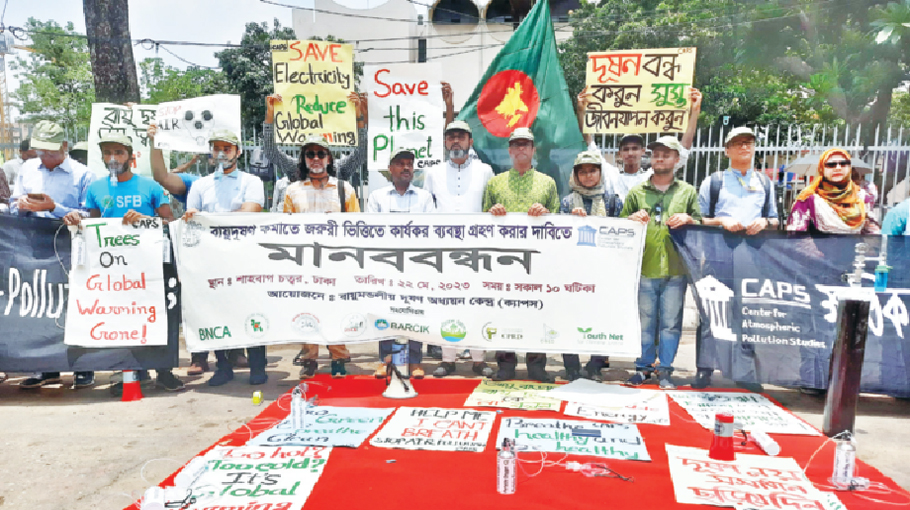14-point recommendation placed to combat air pollution


Center for Atmospheric Pollution Studies (CAPS), an atmospheric research organisation in Bangladesh; and some other rights bodies and environmental platforms have placed 14-point recommendations in order to check air pollution in the country.
The recommendations were placed at a human chain programme held at Shahbagh in the capital on Monday (May 22) demanding urgent and effective measures to reduce air pollution.
Bangladesh Nature Conservation Alliance (BNCA), Bangladesh Resource Center for Indigenous Knowledge (BARCIK), YouthNet for Climate Justice, Centre for Global Environment and Development (CGED), Save Future Bangladesh, Green Voice and some other platforms were the co-organizers of the event.
Prof. Dr. Ahmad Kamruzzaman Majumder, founding chairman of CAPS and head at Environmental Science dept of Stamford University; Dr. Adil Mohammad Khan, a professor at Urban and Regional Planning dept Jahangirnagar University and executive director at the Institute for Planning and Development (IPD); Architect Iqbal Habib, a joint secretary at Bangladesh Paribesh Andolan (BAPA); Alamgir Kabir, another joint secretary at BAPA; Md Jahangir Alam, coordinator at BARCIK; Abdul Wahab, executive director at CGED; Shuman Shams of BNCA; Humayun Kabir Sumon, co-coordinator at Green Voice; Imran Sarker of CPED; Mahmuda Islam, coordinator at Paribesh Uddyog; and Sohanur Rahman, executive coordinator at YouthNet for Climate Justice; spoke on the occasion, among others.
The rights activists and environmentalists at the human chain programme expressed the opinion that air pollution will be controlled in the country if their four-point demand and 15-point recommendation are accepted after review at the policy level.
The demands are- to maintain the previous standard of PM2.5 in the Air Pollution (Control) Rules-2022 at least 15 micrograms per cubic metre; the Rules must be strengthened with the emission standards and the standards of the stack emissions at Integrated Energy and Power Master Plan (IEPMP) must be reconsidered; the Department of Environment (DoE) must ensure use of low sulfur (50 ppm) in imported diesel; and the DoE must include coal and oil-based thermal power plants (up to 50 MW) and gas-based thermal power plants (up to 100 MW) in the red category.
Meanwhile, among the 15-point recommendation, the rights activists placed nine short-term and medium-term recommendations: and six long-term recommendations.
The short-term and mid-term recommendations include illegal brick kilns should be stopped and the use of advanced technology to burn bricks should be ensured; the construction site should be covered during the construction work; city corporation, fire service, WASA and the DoE should make arrangements to sprinkle water every two to three hours every day in the polluted cities during the dry season as per the High Court directives; a large number of trees should be planted; and introduction of separate cycle lanes in urban areas.
The long-term recommendations include enactment of the Clean Air Act; the annual budget allocation for the Ministry of Environment should be increased; improving traffic system; and environment cadre service and environment police should be introduced and the functioning of environment court should be speeded up.
In his speech, Prof. Dr. Ahmad Kamruzzaman Majumder said that the environmental pollution in Bangladesh has reached such a level that many cities are gradually losing their ability to live. Alongside climate change, air pollution is also responsible for the intense heat wave in the country. In such a situation, it is important to reduce air pollution. However, no significant coordinated efforts are being taken in this regard, he added.

